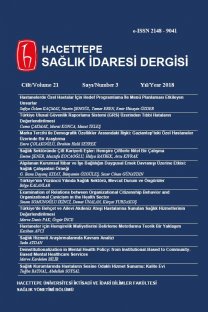Referans Fiyat ve İlaç Piyasası
Kamu ilaç harcamalarının bütün ülkelerde belirgin bir biçimde arttığı görülmektedir. Dolayısıyla ilaç harcamalarının kontrol altına alınması yönündeki tartışmalar önemli bir konu haline gelmiştir. Bu yüzden ilaç harcamalarının kontrolü amacıyla en sık kullanılan yöntemlerden biri olan referans fiyat birçok ülkede uygulanmaya başlanmıştır. Referans fiyat sistemi ilgili otoritenin ya da sigorta şirketinin belli bir grupta yer alan ilaçlar için geri ödemeye esas en yüksek düzeyin belirlerlendiği bir sistemdir. İlaç piyasasına yönelik bu şekildeki bir düzenlemenin rekabetin artmasını sağlayarak ilaç fiyatlarında ve harcamalarında azalmaya neden olacağı varsayılmaktadır
Anahtar Kelimeler:
İlaç Harcamaları, Referans Fiyat, Jenerik İlaç, Geri Ödeme
___
- Aronsson T. et. al. (2001) ―The Impact of Generic Drug Competition on
- Brand Name Market Shares—Evidence from Micro Data‖, Review of
- Industrial Organization. 19: 425–435. 2.
- Bergman M. A. and Rudholm N. (2003) ―The Relative Importance of
- Actual and Potential Competition: Empirical Evidence from the
- Pharmaceuticals Market‖, Journal of Industrial Economics. 51(4): 455– 467. 3.
- Brekke K. R. et. al. (2009) ―Regulation and Pricing of Pharmaceuticals:
- Reference Pricing or Price Cap Regulation‖, European Economic
- Danzon P. M. (2001) ―Reference Pricing: Theory and Evidence‖ In López-Casasnovas, G., and Jonsson, B. (ed.), Reference Pricing and Pharmaceutical Policy: Perspectives on Economics and Innovation, pp: 86-126. Springer, Barcelona.
- Danzon, P.M. and Liu H. (1996) ―RP and physician drug budgets: The German Experience in Controlling Pharmaceutical Expenditures", Working Paper, The Wharton School.
- Dukes M. N. (2002) ―Accountability of the Pharmaceutical Industry‖, The Lancet. 360: 1682-1684.
- Forbes (2008) www.forbes.com
- Frank R. G. and Salkever D. S. (1997) ―Generic Entry and the Market for Pharmaceuticals‖, Journal of Economics & Management Strategy. 6: 75–90.
- Grabowski H. (2002) Patents, ―Innovation and Access to New Pharmaceuticals‖, Journal of International Economics Law. 5(4): 849 - 860.
- Grabowski H. and Wang R. (2006) ―The Quantity and Quality of Worldwide New Drug Introductions: 1982-2003‖, Health Affairs. 25(2): 452-460.
- Grabowski H. G. and Vernon J. M. (1992) ―Brand Loyalty, Entry, and Price Competition in Pharmaceuticals after the 1984 Drug Act‖, Journal of Law and Economics. 35(2): 331-350.
- Huber M. and Orosz E. (2003) ―Health Expenditure Trends in the OECD Countries, 1990–2001‖, Health Care Financing Review. 25(1): 1–22
- Ioannides-Demos L. L. et. al. (2002) ―Reference-based Pricing Schemes: Effect on Pharmaceutical Expenditure, Resource Utilization and Health Outcomes‖, PharmacoEconomics. 20(9): 577-591.
- IMS (2008) IMS Health 2008.
- Kaló Z. et. al. (2007) ―Does Therapeutic Reference Pricing Always Result in Cost-Containment? The Hungarian Evidence‖, Health Policy. 80: 402– 412.
- Kildemoes et. al. (2006) ―The Impact of Population Ageing on Future Danish Drug Expenditure‖, Health Policy. 75: 298-311.
- King D. R. and Kanavos P. (2002) ―Encouraging the Use of Generic Medicines: Implications for Transition Economies‖, Croatian Medical Journal. 43: 462–469.
- Lichtenberg F. R. (1996) ―Do (More and Better) Drugs Keep to People Out of Hospital‖, The American Economic Review. 86(2): 384-388.
- López-Casasnovas G. and Puig-Junoy J. (2000) ―Review of the Literature on Reference Pricing‖, Health Policy. Vol. 54: 87–123.
- López-Casasnovas G. and Puig-Junoy J. (2005) ―Reference Pricing as a Pharmaceutical Reimbursement Mechanism‖, The Public Financing of Pharmaceuticals. In J. Puig-Junoy (ed.), pp: 103-123. Edward Elgar, Cheltenham.
- Maynard A. and Bloor, K. (2003) ―Dilemmas in Regulation of the Market for Pharmaceuticals‖, Health Affairs. 22(3): 1-11.
- Miller R. D. Jr. and French H. E. (2000) ―Is There a Link Between Pharmaceutical Consumption and Improved Health in OECD Countries?‖, Pharmacoeconomics. 18: 33–45.
- OECD (2008a) Health a Glance 2008, OECD, Paris.
- OECD (2008b) Pharmaceutical Pricing in a Global Market, OECD, Paris.
- Paris V. and Docteur E. (2006) Pharmaceutical Pricing and Reimbursement Policies in Canada, OECD Health Working Paper No. 24, OECD, Paris.
- Paris V. and Docteur E. (2008) Pharmaceutical Pricing and Reimbursement Policies in Germany, OECD Health Working Papers, No. 39, OECD, Paris.
- Pavcnik N. (2002) ―Do Pharmaceutical Prices Respond to Potential Patient Out-of-Pocket Expenses?‖, RAND Journal of Economics. 33 (3): 469–487.
- Pharmaceutical Pricing and Reimbursement Information (2008) Germany Pharma Profile, PPRI 2008.
- Pharmaceutical Research and Manufacturers of America (2005) Pharmaceutical Industry Profile 2008, Washington, DC.
- Puig-Junoy J. (2004) ―Incentives and Pharmaceutical Reimbursement Reforms in Spain‖, Health Policy. 67: 149–165.
- Puig-Junoy J. (2007) ―The Impact of Generic Reference Pricing Interventions in the Statin Market‖, Health Policy. 84: 14-29.
- Schneeweiss S. (2007) ―Reference Drug Programs: Effectiveness and Policy Implications‖, Health Policy. 81: 17–28.
- Simoens S. and Coster De S. (2006a) ―Potential Savings from Increased Substitution of Generic for Originator Medicines in Europe‖, Journal of Generic Medicines. 4(1): 43-45.
- Simoens S. and Coster De S. (2006b) ―Sustaining generic medicines markets in Europe‖, Journal of Generic Medicines. Vol. 3 (1): 257-268
- Sood N. et. al. (2009) ―The Effect of Regulation on Pharmaceutical Revenues: Experience In Nineteen Countries‖, Health Policy. 28(1): 125- 137.
- Zweifel P. and Crivelly L. (1996) ―Price Regulation of Drugs: Lessons from Germany‖, Journal of Regulatory Economics. 10: 257–273.
- Yayın Aralığı: Yılda 4 Sayı
- Başlangıç: 2015
- Yayıncı: Hacettepe Üniversitesi İktisadi ve İdari Bilimler Fakültesi
